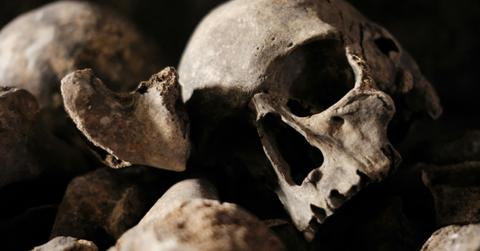Marks Found on Skulls Prove Egyptians on Forefront of Cancer Treatment 4,000 Years Ago, Researcher Says

Cut marks on a 4,000-year-old Egyptian skull may show early attempts to treat cancer through surgery, or to investigate the cancer after the patient's death, researchers say.
Ancient Egyptians were able to treat a variety of diseases and injuries, even crafting prosthetic limbs and putting in dental fillings. A new study of two skulls published in the journal Frontiers in Medicine by an international team of researchers suggests they may have been trying to learn how to treat cancer.
“We see that although ancient Egyptians were able to deal with complex cranial fractures, cancer was still a medical knowledge frontier,” said Tatiana Tondini, a researcher at the University of Tübingen and first author of the study.
Researchers looked at two skulls held in the University of Cambridge’s Duckworth Collection. On skull 236, which belonged to a 30- to 35-year-old male between 2687 and 2345 BCE, they found a large lesion consistent with tissue destruction, along with around 30 smaller metastasized lesions. Around the lesions were distinct cut marks.
“When we first observed the cutmarks under the microscope, we could not believe what was in front of us,” said Tondini.
“It seems ancient Egyptians performed some kind of surgical intervention related to the presence of cancerous cells, proving that ancient Egyptian medicine was also conducting experimental treatments or medical explorations in relation to cancer,” said co-author Prof Albert Isidro, a surgical oncologist at the University Hospital Sagrat Cor, who specializes in Egyptology.
“This finding is unique evidence of how ancient Egyptian medicine would have tried to deal with or explore cancer more than 4,000 years ago,” said the study’s lead author, Prof Edgard Camarós, a paleopathologist at the University of Santiago de Compostela. “This is an extraordinary new perspective in our understanding of the history of medicine.”
Skull E270, dated to between 663 and 343 BCE, belonged to a female over 50 years old and also showed a large lesion consistent with a cancerous tumor, suggesting cancer was a common problem in the past as it is now despite lifestyle changes over time.
The woman's skull also showed two healed lesions from traumatic injuries, one of which appeared to be caused by a "close-range violent event using a sharp weapon." The fact that the lesions healed indicates the woman may have received treatment that allowed her to survive her injuries.
Researchers say that traumatic injuries of that type are not commonly found on female specimens, and most violence-related injuries are found on male specimens.
“Was this female individual involved in any kind of warfare activities?” asked Tondini. “If so, we must rethink the role of women in the past and how they took active part in conflicts during antiquity."
Researchers say that despite the intriguing findings, it's difficult to draw conclusions from archeological specimens because remains are often incomplete and lack clinical history.
“In archaeology we work with a fragmented portion of the past, complicating an accurate approach,” Isidro said.
“This study contributes to a changing of perspective and sets an encouraging base for future research on the field of paleo-oncology, but more studies will be needed to untangle how ancient societies dealt with cancer,” said Camarós.
TMX contributed to this report.
Become a Front Page Detective
Sign up to receive breaking
Front Page Detectives
news and exclusive investigations.
